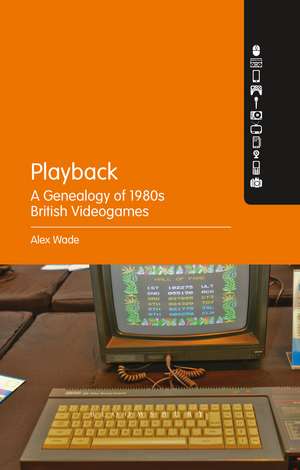Playback – A Genealogy of 1980s British Videogames
Autor PhD Alex Wadeen Limba Engleză Hardback – 19 oct 2016
| Toate formatele și edițiile | Preț | Express |
|---|---|---|
| Paperback (1) | 235.44 lei 6-8 săpt. | |
| Bloomsbury Publishing – 18 apr 2018 | 235.44 lei 6-8 săpt. | |
| Hardback (1) | 713.72 lei 6-8 săpt. | |
| Bloomsbury Publishing – 19 oct 2016 | 713.72 lei 6-8 săpt. |
Preț: 713.72 lei
Preț vechi: 914.12 lei
-22% Nou
Puncte Express: 1071
Preț estimativ în valută:
136.58€ • 141.79$ • 113.89£
136.58€ • 141.79$ • 113.89£
Carte tipărită la comandă
Livrare economică 22 martie-05 aprilie
Preluare comenzi: 021 569.72.76
Specificații
ISBN-13: 9781628924893
ISBN-10: 1628924896
Pagini: 192
Dimensiuni: 152 x 229 x 17 mm
Greutate: 0.43 kg
Editura: Bloomsbury Publishing
Colecția Bloomsbury Academic
Locul publicării:New York, United States
ISBN-10: 1628924896
Pagini: 192
Dimensiuni: 152 x 229 x 17 mm
Greutate: 0.43 kg
Editura: Bloomsbury Publishing
Colecția Bloomsbury Academic
Locul publicării:New York, United States
Caracteristici
Uses interviews with key developers to strengthen the historical material by providing readers with an insight into developments of the time
Notă biografică
Alex Wade is Senior Research Fellow in the Faculty of Health, Education and Life Sciences at Birmingham City University. He has previously written on space and time in videogames, French social theory and media history. His current research interests focus on the relationship between technology and learning in historical and contemporary contexts.
Cuprins
IntroductionChapter 1. Back to the Future? The Habitus of the 1980s Chapter 2. Developing the Future: Bedroom coding and developmentChapter 3. Subterranean Subculture: Arcade Gaming Chapter 4. Format Wars Conclusion
Recenzii
An interdisciplinary approach to the history of British video games of the 1980s, examining not only their industrial and social contexts, but other interrelated cultural issues, such as 'bedroom coding', arcades, and the economic conditions shaping the zeitgeist. Sure to be of interest not only to Media Studies scholars, but to students of British culture in general.
A complete picture [of the] bedroom gaming culture in the UK.
Playback reads like a labour of love and seriously theoretical tour de force. Working in the boundaries between genealogy, habitus and subculture, but always resisting the easy option of one categorisation, Wade puts Foucault and Bourdieu to work on 80s games as archaeology in the specific context of post-industrial social dynamics. Understood this way, games demand transdisciplinary energy - as the author has it, "the time for academic investigation is now." I learned a lot.
With so much work on videogame history reproducing discourses of technological progression, Wade's focus on the cultures and practices of arcade gaming, bedroom coding and copying provides an important corrective to the linear timelines of platform 'generations'. This detailed and carefully-theorised book is essential reading for anybody interested in understanding the social, cultural, political and economic contexts of 1980s videogame development and consumption in the UK - and how these factors shape the contemporary landscape of gaming.
A complete picture [of the] bedroom gaming culture in the UK.
Playback reads like a labour of love and seriously theoretical tour de force. Working in the boundaries between genealogy, habitus and subculture, but always resisting the easy option of one categorisation, Wade puts Foucault and Bourdieu to work on 80s games as archaeology in the specific context of post-industrial social dynamics. Understood this way, games demand transdisciplinary energy - as the author has it, "the time for academic investigation is now." I learned a lot.
With so much work on videogame history reproducing discourses of technological progression, Wade's focus on the cultures and practices of arcade gaming, bedroom coding and copying provides an important corrective to the linear timelines of platform 'generations'. This detailed and carefully-theorised book is essential reading for anybody interested in understanding the social, cultural, political and economic contexts of 1980s videogame development and consumption in the UK - and how these factors shape the contemporary landscape of gaming.























